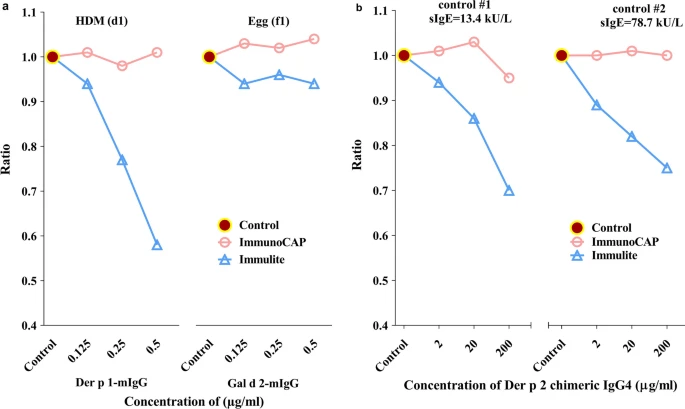Measurements of allergen-specific IgE antibodies with different manufacturers’ assays show modest or poor agreement. This study compares analytical performance of specific IgE tests for whole allergen extracts and individual allergen components of two assay systems, IMMULITE and ImmunoCAP, using human sera as well as monoclonal antibodies.
Comparisons were performed for specific IgE to house dust mite (HDM, n = 44), egg white (EW, n = 36) and the allergen components rDer p 1, rDer p 2, nGal d 1, nGal d 2 and nGal d 4 in human sera and with monoclonal mouse/human chimeric IgE antibodies specific for the same allergen components. Competitive interference with IgE measurement was investigated using allergen-specific monoclonal IgG and IgG4 antibodies.
Measurements of IgE to HDM and EW in serial dilutions of human sera revealed weaker dilution linearity with IMMULITE than with ImmunoCAP. Analysis of five different monoclonal IgE antibodies with total and specific IgE assays, expected to return similar levels, gave an average specific/total IgE ratio of 0.96 (range 0.71–1.14) with ImmunoCAP and 1.89 (range 0.76–2.85) with IMMULITE, indicating overestimation of specific IgE by IMMULITE. With the EW IgE tests of both assay systems, measurements of a chimeric anti-Gal d 2 IgE antibody were unaffected by a competing mouse IgG antibody. While the same was true for measurement of a chimeric anti-Der p 1 IgE antibody using the HDM test in ImmunoCAP, a suppression of measured concentrations by up to 42% was observed in IMMULITE. Similarly, measurement of HDM-specific IgE in human sera by ImmunoCAP was unaffected by a competing monoclonal anti-Der p 2 IgG4 antibody while IMMULITE displayed a reduction of HDM-specific IgE values by up to 30%.
In this evaluation of analytical performance of two widely used assay systems, ImmunoCAP showed higher accuracy in quantitation of specific IgE and greater resistance against competing allergen-specific non-IgE antibodies which may arise through natural or dietary exposure, or as a result of allergen immunotherapy treatment.

No comments:
Post a Comment